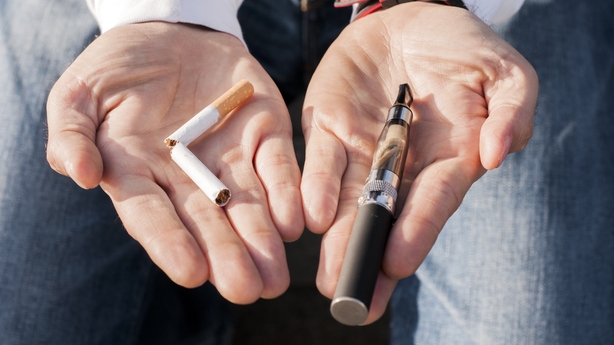We sat down with Dr. Paul Kavanagh, a spokesperson with the HSE, to discuss the side effects and health concerns of vaping.
What is a vape?
E-cigarettes (electronic cigarettes) are battery-powered devices that heat liquid into an aerosol that can be inhaled - a process called vaping.
Often packaged in colourful, pocket-sized containers, vapes are available in sweet flavours that are especially appealing to young people such as bubble gum, cotton candy, juicy fruit, and pink lemonade.
As well as these flavourings, e-cigarettes usually contain nicotine as well as other chemicals which the HSE say may include ultrafine particles, volatile organic compounds, cancer-causing chemicals, and heavy metals.
We need your consent to load this rte-player contentWe use rte-player to manage extra content that can set cookies on your device and collect data about your activity. Please review their details and accept them to load the content.Manage Preferences
Are there particular health concerns for young people?
In 2020, the Health Research Board undertook an evidence review on the harms associated with e-cigarettes. They identified a range of harms including poisoning, burns, lung injury and exacerbations of asthma. They also found carcinogens – chemicals that can cause cancer.
"Nicotine itself is very addictive, particularly for children and young people," says Dr. Kavanagh. "It has an effect in terms of a developing brain, in terms of impulse control, concentration, and mood disorders."
"I think what's very worrying as well is that, children and young people who use these e-cigarettes, who don't smoke, are three to five times more likely to start smoking."

Is vaping worse than smoking?
Compared to cigarettes, vaping may be less harmful, but that does not mean that it is harm-free.
"Smoking," says Dr. Kavnagh. "Here's a product that - when used exactly as the manufacturers intend them to be used - kills one in two people. People can expect to lose, on average, 10 years of life if they've been smoking across their life. 100 people die each week from smoking in Ireland. 1,000 people are hospitalised So, to say that something is not as dangerous or not as harmful as smoking? That's an incredibly low bar."
"When you inhale an e-cigarette, you're not inhaling the tobacco plant that's being burnt," he later explains. "So, not as harmful, but not as harmful doesn't mean safe. The 'not as harmful as cigarettes' message has perhaps distorted people's risk perception around e-cigarettes."
We need your consent to load this rte-player contentWe use rte-player to manage extra content that can set cookies on your device and collect data about your activity. Please review their details and accept them to load the content.Manage Preferences
What are the long-term effects?
At time of writing, health experts still don't have a grasp on the long-term impact of vaping, but Dr. Kavanagh believes that the results will likely be cause for concern, and urges users to stop as soon as possible, ideally before they fall into the cycle of nicotine addiction and withdrawal.
"It's taken us decades to really understand, comprehensively and robustly, what the harms are associated with smoking," he explains, noting that it will likely be "another decade" before health experts can definitely show "risk of respiratory disease, risk of cardiovascular disease, risk of cancer, risk or problems in pregnancy" when it comes to vaping.
What is clear, in 2023, is that e-cigarettes are filled with ingredients that are undoubtedly cause for concern.
"In terms of what's contained in that e-cigarette plume; there's nicotine, ultra-fine particles, heavy-metals, volatile compounds, and other things that we know are cancer-causing," he says. "There's flavourings as well, in particular, many of these products use diacetyl which has been associated with lung harm."

Does vaping help people to quit smoking?
Anecdotal evidence would suggest that some smokers are picking up vapes in the hopes that it will help them to cut down on cigarettes or even quit the habit altogether. However, according to Dr. Kavanagh, there is no evidence to suggest that this would be the case.
"I led a group in the HSE, under the Department of Health, and examined that question when we were developing Ireland's first national stop-smoking guideline," he explains.
Studying international evidence and reviews from the health research board, Dr. Kavanagh says his team reviewed a number of supports such as nicotine replacement therapy, quit lines, behavioural support, and e-cigarettes.
In the case of e-cigarettes, the evidence was "very mixed", and actually saw many smokers becoming "dual users", meaning that they smoked both cigarettes and vapes - something that the HSE does not recommend.
As well as the number of concerning chemicals, Dr. Kavanagh insists that vapes are not a good option for cutting down on smoking as they are not regulated in the same way that nicotine replacement products are.
"They are not licensed as a medical product in Ireland, so they don't have all the safeguards around them that you would have if you were to go into a chemist and buy nicotine replacement or something like that."

Tips for quitting
If you are hoping to quit smoking or vaping, you can get support from a stop-smoking advisor, GP, or pharmacist using licensed stop-smoking medicines.
According to Dr. Kavanagh, the HSE has began making nicotine replacement therapy free-of-charge to those who use their stop smoking services.
For more information, click here or Freetext QUIT to 50100 or Freephone 1800 201 203.

